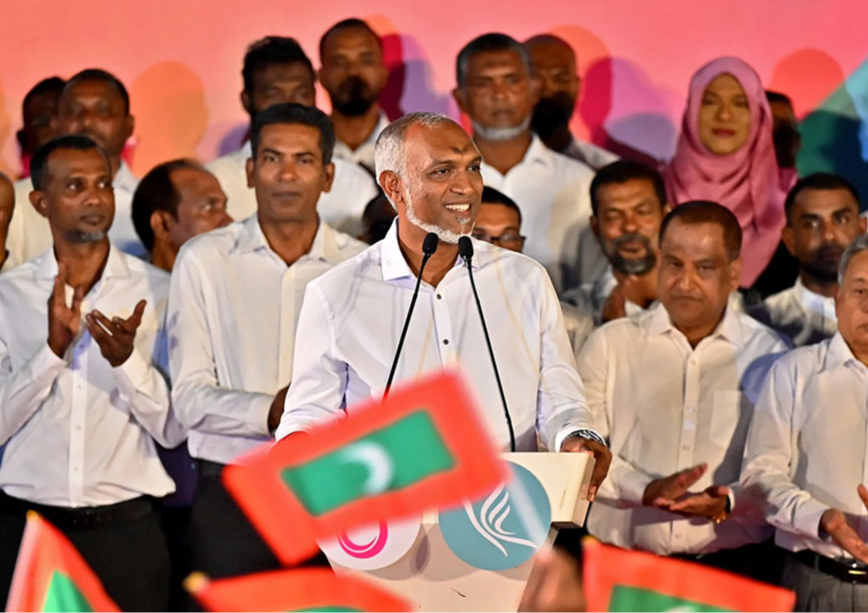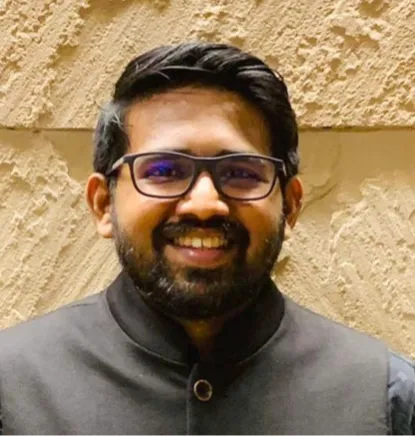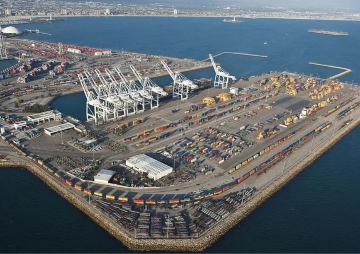
The recently concluded elections in the Maldives witnessed President Mohamed Muizzu’s party—The People’s National Congress (PNC) secure a supermajority in the Parliament. The ruling party now directly controls over 73 out of 93 seats in the country. Domestically, Muizzu seems to have survived his toughest political challenge so far. His strong hold over the country’s legislature will likely embolden his policy of diversifying relations from India and increasing cooperation with China. However, a pragmatic and rational policy might likely convince him to stay away from alienating India completely.
An assessment of the electoral outcome
PNC’s victory can be attributed to several factors. First, as some Maldivian journalists suggest, all parliamentary elections since 2014 have seen the electorate empowering the President, allowing them to run a hassle-free government. In this regard, this election seems to be no different. Second, there were many instances of abuse of state resources. Several new projects were announced or inaugurated during or just before the elections. The government has also secured votes by offering political appointments. Since his swearing-in, Muizzu has appointed more than 300 ministers in his cabinet and sanctioned several political appointments for the state-owned enterprises, many even just before the elections. Third, Muizzu’s nationalist rhetoric and India’s withdrawal of troops seem to have likely reinforced the public’s confidence in his electoral and mega-infrastructure promises. Finally, vote buying was also a largely practised tactic by all the parties in the elections.
Two political strategies have also likely worked in Muizzu’s favour. One, to avoid further factionalism within the PNC, especially between Yameen loyalists and individuals loyal to Muizzu, the ruling party encouraged some of their loyalists to contest independently. Second, being alienated by big parties, PNC made some concessions to the smaller parties. By not fielding PNC candidates from the constituencies of the leaders of Maldives Development Alliance (MDA), Maldives National Party (MNP), and Jumhoory Party (JP), Muizzu seemingly convinced those parties to contest from limited seats.
These factors and strategies helped Muizzu to garner support from swing voters and members of the JP, MNP, and MDA, besides his PPM-PNC vote base (see Table 2). This gave his party an overwhelming majority of 66 votes. Following which, seven of eleven independent MPs—who were endorsed by Muizzu rejoined his party. Support from MDA (2 MPs), JP (1 MP), and MNP (1 MP) has further increased his overall strength to 77 MPs. Therefore, empowering Muizzu and his PNC party significantly.
Table 1. Parties representation in Parliament and seats contested
|
Political Parties
|
Seats secured in the Parliament
|
Seats contested
|
|
PNC
|
66 (+7 independents)
|
90
|
|
MDP
|
12
|
89
|
|
Independent
|
11 (-7)
|
130
|
|
MDA
|
2
|
4
|
|
JP
|
1
|
10
|
|
MNP
|
1
|
2
|
|
The Democrats
|
0
|
39
|
|
AP
|
0
|
4
|
Source: Election Commission
Table 2. Party memberships and votes
|
Political Parties
|
Memberships
|
Total votes for Majlis elections
|
Total votes during the primary round of Presidential elections
|
|
MDP
|
51,919
|
64,650
|
86, 161
|
|
PPM
|
35,987
|
-
|
-
|
|
PNC
|
28,236
|
101,120
|
101, 635
|
|
JP
|
18,186
|
3,141
|
5,460
|
|
AP
|
8,746
|
2,538
|
-
|
|
MDA
|
8,516
|
4,071
|
-
|
|
MNP
|
7,807
|
1,060
|
1,907
|
|
The Democrats
|
4,404
|
4,635
|
15,839
|
|
Independents
|
-
|
29,175
|
-
|
Source: Election Commission
On the other hand, the Opposition, especially the Maldivian Democratic Party (MDP), despite being eligible for some parliamentary committees, will be alienated with just 12 MPs. The MDP has been unable to muster votes beyond their usual voter base. The party has also seen a significant decrease in the number of votes when compared to the primary round of presidential elections (Table 2). They have also failed to win a seat in their traditional stronghold, Addu. Dissatisfaction with the MDP leadership, issues of corruption, and their control of the Parliament following Muizzu’s elections seems to have cost them dearly.
Parties cooperating with the MDP have also faced a humiliating defeat. Adhaalath Party, the MDP's coalition partner, has failed to secure a seat in the Parliament for the second consecutive term. The split parties—the Democrats and the People’s National Front—that splintered from the MDP and PPM-PNC have secured zero seats despite being led by two former presidents. The Democrats' votes have been restricted to their vote base and have significantly reduced from the primary round of presidential elections (Table 2)—indicating their diminishing relevance in the political landscape. None of the 35 independent candidates endorsed by PNF and Yameen secured a seat either. Overall, the Opposition, especially the mainstream parties, seems weakened and cornered both in the executive and the legislature.
Strategic implications:
Muizzu’s attempts to diversify relations with India are linked to his promotion of nationalism and his efforts to muster domestic support. With an overwhelming majority now, Muizzu is more politically stable and secure, which incentivises him to tone down his anti-Indian rhetoric and reconcile with Delhi. But, at the same time, his equation with China remains unchanged. His party continues to enjoy close relations with the Communist Party of China and perceives the country as a pro-efficient partner. In addition, China also remains keen on having a stronger presence in the Maldives and pushing back against India in the country.
China has made significant inroads in the Maldives in the past five months. In January 2024, Muizzu signed over 20 Memorandums of understanding (MoUs) to cooperate on blue, digital, and green economy, human resources, disaster mitigation, fisheries, agriculture, tourism, health, etc. A noteworthy trend is that, unlike the Yameen years, China is increasingly investing in smaller community development projects and partnerships. It has either committed or donated ambulances, civilian vehicles, laboratory equipment, and 1,500 tonnes of bottled water. It is building desalination plants, state-of-the-art fish processing plants, and power plants for electricity generation, and also commencing smart utility services in the Maldives. Some projects, such as developing Ras Malé ́ island and its housing units, expanding the Velana Airport, redeveloping roads in Malé, and free maintenance of the Sinamale bridge for three years, will enable Beijing to have more on-ground presence in the country. Both countries are also increasing their defence cooperation through a Strategic Comprehensive Partnership and a defence pact. The government has also agreed to participate in China’s Global Security Initiative, Global Civilisation Initiative, and Global Development Initiative and expedite the Belt and Road Initiative (BRI) projects.
On the other hand, the new government is reducing dependence on India and checkmating it in some strategic investments. For instance, the China Harbouring Engineering Company has signed an MoU with Maldives to reclaim 200 hectares of land in Uthuru Thila Falhu (UTF), construct an agriculture industrial park, and equip it with modern technology like drones. This project is in the same region as the India-funded UTF Coastguard harbour, and could help China keep a close eye on the Indian project. China will also develop Kadhdhoo airport, where a batch of Indian troops are reportedly located and will soon be substituted by civilian experts. The government is also proposing to shift the Gulhifalhu port to Thilafushi and is opening the latter for private investors, even as Indian EXIM funded the reclamation of Gulhifalhu and maintains that only Indian firms can develop the port. Muizzu also recently claimed that the Indian civilian experts in the Maldives are based on an agreement and will be stationed in the country temporarily. The Maldives is also attempting to reduce its dependence on India for defence, food imports, health insurance, drugs, and tourism.
The recent victory in the Parliament is only likely to embolden this foreign policy of Muizzu’s. The victory has obliterated China’s earlier reservations with Muizzu, such as his lack of strength in the Parliament and distancing from Yameen. China’s welcoming of the recent electoral outcome further demonstrates its willingness to expand relations with the island nation for the next five years. With a supermajority in the parliament, there are also substantial risks of passing the bill on the Free Trade Agreement with China without much scrutiny, unilateral cancellation of projects (including Indian projects), and passing laws like foreign ownership of islands, as seen when Yameen was in power. Besides, the government has also decided to revive resort development projects in undeveloped islands that have been on halt since 2019. Some of these investments are from China and have caused significant security concerns previously. Overall, it seems that India will face increasing challenges from China as Muizzu embraces a closer relationship with the latter.
A perennial status quo?
This is not to suggest that Muizzu will be politically secure with a pro-China policy throughout the next five years.
A supermajority does not guarantee that the government will function without any ruptures. Similar to the ruling party, the Opposition will leverage the loopholes in the newly passed anti-defection law to increase their strength and reduce the ruling party’s unity in the parliament. Buying votes from the MPs could emerge as a more frequently occurring phenomenon in this Parliamentary tenure. Further, the AP, MDP, Democrats, and PNF will likely cooperate with each other to keep Muizzu in check. Despite not having any legislative and executive power, they might use their members and street power to mobilize crowds and pressure the government on multiple fronts, including its external conduct.
Similarly, the PNC’s majority will weaken some, if not all of India’s leverages. With a weak opposition in the Parliament, Muizzu can unilaterally cancel projects and diversify health insurance schemes, drugs, tourism, and food imports from India despite economic costs. But other leverages like India’s geographical proximity, economic growth, and development assistance remain unaffected by the elections. And if Muizzu embraces a pragmatic and rational approach, rather than being influenced by ideological and personal leanings alone, then he will be able to use these leverages to further Maldives’ interests. For one, he would not want to reduce his options for diplomatic manoeuvring by alienating India completely. It is then likely that Muizzu would embrace a working relationship with India even as he maintains a pro-China tilt.
Aditya Gowdara Shivamurthy is an Associate Fellow at the Observer Research Foundation.
The author would like to thank Ambika Pandey, a Research Intern at the Observer Research Foundation, for her assistance with data collection.
The views expressed above belong to the author(s). ORF research and analyses now available on Telegram! Click here to access our curated content — blogs, longforms and interviews.




 PREV
PREV


